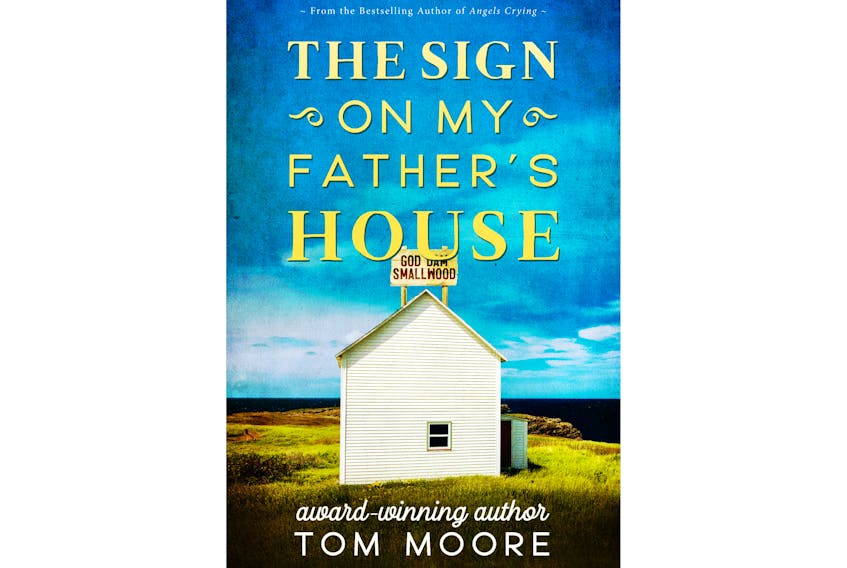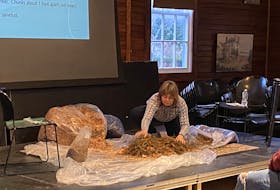This is a coming-of-age narrative neatly reinforced by its time period: a coming-of-age province of Newfoundland.
It’s 1966, in Curlew, Conception Bay. Felix Ryan is 13 and delivering a book report on “Gone with the Wind” when he spots Ellen Monteau, “the most beautiful human being I had ever seen.” None of the ensuing drama, unfolding as he leaves Curlew for Memorial University and then parts beyond, will dislodge this first deep impression.

Felix lives with his father Walter, and his stepmother Shirley. There’s none of the traditional fairy tale dynamics with the latter: “She was always trying to be my real mother and set a good example.” Felix’s mother, Mary, died when she was just 31, but he has very clear memories of her, all striking, comforting, and character-forming:
“Years before, my mother had told me we were all made from stardust. Carbon, hydrogen, nitrogen, calcium, phosphorus, magnesium, sodium, sulphur, and chlorine – the elements that make up the human body ever since God created us from the dust of the earth. We are all made of stardust, she said. So, for me, God had no white beard. He was no Charlton Heston telling us to slay the Amalakites. He was more like my mother — loving and wonderful, capable of making the eternal stars.”
His relationship with his father is more complex. Not that Walter is cruel or distant — far from it; he’s very proud of, and present for, his son. Walter, like a lot of men in Curlew, is handy, a bit of a jack-of-all-trades, picking up the odd construction job. But he has one major difference, in that he’s a mainlander. Well, make that two. It’s the height of Smallwood adoration, and Walter cannot stand the man. In fact, he’s so riled by what he terms Smallwood’s reckless, relentless determination to destroy a way of life that he nails the titular (anti-Smallwood) sign to the top of the Ryans’ house.
Walter’s no fool, he knows there will be repercussions. Shirley, a schoolteacher on an annually renewed contract, might not get work. Neighbours, once friendly, will be roused. Local religious denominations (and don’t get him started on that) might get involved. But his opinion of Smallwood is his opinion of Smallwood and there it is.
Felix’s connection to his dad is the hub of this story, but there are many spokes.
An early bit of communal pushback comes at a local wedding. Felix, sneaking drinks of rum via his friend Monk (a highly informed and useful person), overhears several men plotting to beat up his dad. Frightened, he returns to their table (where Walter and Shirley are sitting alone) to warn him.
“I loved to watch my father thinking, for that was the only time he was really relaxed. His eyes were distant and his face radiated a new calm, as if he had been waiting for this moment. Then he unbuttoned the top of his shirt and laid his tie on the table.” Fortunately, it turns out Walter can both start fights and finish them.
As a teenager, Felix works at White’s General Store, an enterprise that will go through several iterations in conjunction with him. Widow and matriarch Clara White runs the premises; she likes Felix. Her son Dick “inspired an air of youthful joy. He was far from a James Dean or Marlon Brando by contemporary standards, but, at forty-five, Dick was the closest thing to a youthful rebel I had ever seen.”
Dick also owns a shiny new white convertible, dusty rose leather interior. Soon he is rocketing down the road — Ellen Monteau beside him.
Clara objects. “You can do better than one of the local girls. She’s barely out of school. They live in a trailer on a back road. She was born out of wedlock … She came from nothing, and she will always be nothing!” Felix also protests, inwardly: Ellen “should marry a shah, a count, a Montreal Canadiens hockey player, or, as I said before, me.”
Felix’s connection to his dad is the hub of this story, but there are many spokes. As the wheel of time turns he is off to university, meeting new people, like roommates Gib, at Billy Crotty’s boarding house, and later Malacat, at Doyle House residence, as well as engaging with the emerging personas of former classmates from Curlew.
“The Sign on my Father’s House” reads so authentically it feels like a memoir. It’s relatable, briskly paced, moving, and funny. If you’re looking for a good story this is a good story (with a kicker last line).
Joan Sullivan is editor of Newfoundland Quarterly magazine. She reviews both fiction and non-fiction for The Telegram.
RELATED:









